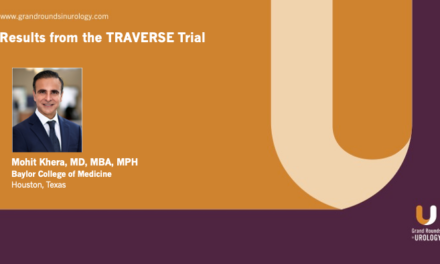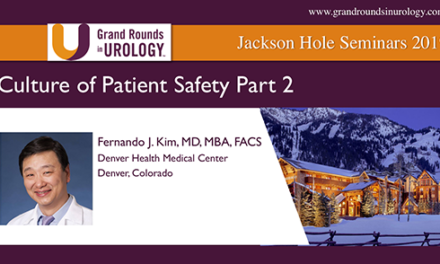Manoj J. Monga, MD, FACS, presented “Asymptomatic Stones: Treat or Observe?” during the 29th Annual Perspectives in Urology: Point-Counterpoint, on November 18, 2021, in Coronado Island, San Diego, California.
How to cite: Monga, Manoj J. “Asymptomatic Stones: Treat or Observe?” November 18, 2021. Accessed Jul 2024. https://grandroundsinurology.com/asymptomatic-stones-treat-or-observe/
Asymptomatic Stones: Treat or Observe?
Manoj J. Monga, MD, FACS, Professor and Chair of Urology at the University of California, San Diego, suggests a situational approach to asymptomatic renal stone treatment based on outcomes data. Dr. Monga explains that asymptomatic renal stones are very common and are diagnosed in some 2 million patients per year. He notes that asymptomatic stones cause significant psychological distress in patients, and in fact tend to worry more than other stone patients. Dr. Monga also clarifies that asymptomatic stones often do not remain asymptomatic, citing data published in the Journal of Endourology showing that 26% of patients ultimately require intervention, 48% experience pain, 55% experience stone growth, and 77% experience any of the previously stated outcomes within 4 years of an asymptomatic stone being identified. He then shows that risk can be further stratified based on stone size and location, explaining that a stone in the renal pelvis is guaranteed to progress while a small upper pole stone is more likely to pass. Dr. Monga states that in most cases asymptomatic stone patients should be treated. He then summarizes the different treatments available for renal stones, observing that patients tend to select the less-invasive shockwave treatment over ureteroscopy even though it is less effective. He states that shockwave treatment’s efficacy varies based on the location and size of the stone, and that this should be discussed with patients. Dr. Monga concludes that stones less than 4mm should be observed and those between 4mm and 10mm should undergo shockwave treatment, while larger stones may require ureteroscopy.
About the 29th Annual Perspectives in Urology: Point Counterpoint conference:
Presented by Program Chair and Grand Rounds in Urology Editor-in-Chief E. David Crawford, MD, this conference brought together leading experts in urology, medical oncology, and radiation oncology to discuss and debate the latest topics in genitourinary cancers, primarily prostate cancer and bladder cancer. This interactive conference offered topical lectures, pro/con debates, interesting-case presentations, interactive panel discussions, and interactive audience and faculty networking.
ABOUT THE AUTHOR
Manoj J. Monga, MD, FACS, is Professor and Chair of Urology at the University of California, San Diego. He previously served as Director of the Stevan B. Streem Center for Endourology & Stone Disease at the Glickman Urological and Kidney Institute at the Cleveland Clinic and the Joseph Sorkness Family Endowed Professor and Vice-Chair of Urologic Surgery and Director of Endourology & Stone Disease at the University of Minnesota. Dr. Monga received his medical degree from the Chicago Medical School and completed his residency at Tulane University School of Medicine.
Dr. Monga is recognized as an international authority in endourology and stone disease, and has been an invited speaker in India, Thailand, Brazil, Italy, Greece, Mexico, China, United Kingdom and the Netherlands. He has also acted as a Visiting Professor at many of the major medical centers in the United States.
Dr. Monga has served on numerous AUA committees, including the Quality Improvement & Patient Safety Committee, Abstract Committee, and Urology Care Foundation’s Outreach Committee. He also served as Chair of the North Central Section’s Education Committee. Dr. Monga has served as the section editor of the Journal of Endourology and served on several other editorial boards, including the Indian Journal of Urology and the International Brazilian Journal of Urology.




